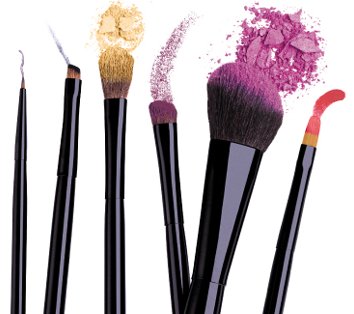 1. Mascara - This is the makeup item you should be most vigilant about: As the brush is taken out, applied, and put back in the tube, it brings with it any bacteria that has collected along the way, explains cosmetic chemist Jim Hammer. Lingering bacteria can cause redness and itchiness, or even conjunctivitis (a.k.a. pinkeye) and sties. Switch mascara every two to three months to be safe.
1. Mascara - This is the makeup item you should be most vigilant about: As the brush is taken out, applied, and put back in the tube, it brings with it any bacteria that has collected along the way, explains cosmetic chemist Jim Hammer. Lingering bacteria can cause redness and itchiness, or even conjunctivitis (a.k.a. pinkeye) and sties. Switch mascara every two to three months to be safe. 2. Foundation - With the exception of powder formulas, all foundations are water-based, which means bacteria love them. Unopened, foundation can last for a couple of years, but once the seal is broken, Hammer says, it's best to replace it after 6 to 12 months.
2. Foundation - With the exception of powder formulas, all foundations are water-based, which means bacteria love them. Unopened, foundation can last for a couple of years, but once the seal is broken, Hammer says, it's best to replace it after 6 to 12 months.  3. Concealers - Concealers are meant to cover blemishes, not cause them—which is what can happen if you use a concealer that's too old. "You'll know it's gone bad because the color will start to shift," says cosmetic chemist Ni'Kita Wilson. Concealers in powder and stick form can last for up to two years, while liquids should be tossed after one.
3. Concealers - Concealers are meant to cover blemishes, not cause them—which is what can happen if you use a concealer that's too old. "You'll know it's gone bad because the color will start to shift," says cosmetic chemist Ni'Kita Wilson. Concealers in powder and stick form can last for up to two years, while liquids should be tossed after one.  4. Face powders - Powders are the Energizer Bunny of makeup. They keep going...and going—at least, for up to two years. Still, as Wilson points out, "some powders contain small amounts of water from botanical extracts, so there's the risk of it growing bacteria if you leave it lying around your bathroom." Look on the ingredients panel for long Latin names—these are often botanicals, and their common names (such as oat extract, chamomile, aloe, bamboo, and green-tea extracts) are typically listed in parentheses.
4. Face powders - Powders are the Energizer Bunny of makeup. They keep going...and going—at least, for up to two years. Still, as Wilson points out, "some powders contain small amounts of water from botanical extracts, so there's the risk of it growing bacteria if you leave it lying around your bathroom." Look on the ingredients panel for long Latin names—these are often botanicals, and their common names (such as oat extract, chamomile, aloe, bamboo, and green-tea extracts) are typically listed in parentheses. 5. Blush - The same rules that apply to face powder apply to powder blush, since neither contain water. Cream blush, however, should be replaced after a year. To prolong the life of any blush, Wilson advises cleaning your blush brush regularly and storing the color in a dark, dry place. After applying foundation and moisturizer, wait a couple minutes before putting on blush. You can also blot excess oils from your face first, then, after your blush is on, immediately wipe off your brush with a dry towel. With powders or creams, texture is also an indicator—if the formula has become so hard it won't budge from the compact, it's time to buy a new one.
5. Blush - The same rules that apply to face powder apply to powder blush, since neither contain water. Cream blush, however, should be replaced after a year. To prolong the life of any blush, Wilson advises cleaning your blush brush regularly and storing the color in a dark, dry place. After applying foundation and moisturizer, wait a couple minutes before putting on blush. You can also blot excess oils from your face first, then, after your blush is on, immediately wipe off your brush with a dry towel. With powders or creams, texture is also an indicator—if the formula has become so hard it won't budge from the compact, it's time to buy a new one. 6. Eye shadow - Eye-enhancing shadows? Yes, please. Eye-irritating ones? No, thanks. To keep your eyes from getting red or itchy, replace powder eye shadows after about three months, according to Hammer. Even though they are similar in formulation to other powders, because they're constantly in contact with a mucous membrane, there's a higher risk of transferring bacteria to the product and then back to the eyes. Pay extra attention to cream-based shadows, which tend to grow bacteria more quickly than powders. If you use your fingers to apply, wash your hands before doing so, and be aware of any color switches or off-putting smells.
6. Eye shadow - Eye-enhancing shadows? Yes, please. Eye-irritating ones? No, thanks. To keep your eyes from getting red or itchy, replace powder eye shadows after about three months, according to Hammer. Even though they are similar in formulation to other powders, because they're constantly in contact with a mucous membrane, there's a higher risk of transferring bacteria to the product and then back to the eyes. Pay extra attention to cream-based shadows, which tend to grow bacteria more quickly than powders. If you use your fingers to apply, wash your hands before doing so, and be aware of any color switches or off-putting smells.  7. Eyeliner - Liquid or pencil, these eye definers should be replaced about every three months. Like eye shadows, they are applied near a sensitive area and can pick up bacteria and bring it back to the eye very easily "without any visible signs of contamination," Hammer warns. If you've used a dingy liner, you could experience redness, itchiness, or, in extreme cases, conjunctivitis. Pencils will last a bit longer than liquid if you're steadfast about regular sharpening, but you'll know they're dead once a white film starts to develop on the tip that can't be sharpened off, says Dubroff.
7. Eyeliner - Liquid or pencil, these eye definers should be replaced about every three months. Like eye shadows, they are applied near a sensitive area and can pick up bacteria and bring it back to the eye very easily "without any visible signs of contamination," Hammer warns. If you've used a dingy liner, you could experience redness, itchiness, or, in extreme cases, conjunctivitis. Pencils will last a bit longer than liquid if you're steadfast about regular sharpening, but you'll know they're dead once a white film starts to develop on the tip that can't be sharpened off, says Dubroff.  8. Lipstick/ Lipgloss - The wrong lipstick color may spoil your mood—but the risk of the formula spoiling (or growing bacteria) is low since they don't contain any water, says Hammer. But since they're repeatedly exposed to the mouth area, he suggests replacing lip products after a year, or if you've recently been sick.
8. Lipstick/ Lipgloss - The wrong lipstick color may spoil your mood—but the risk of the formula spoiling (or growing bacteria) is low since they don't contain any water, says Hammer. But since they're repeatedly exposed to the mouth area, he suggests replacing lip products after a year, or if you've recently been sick.  9. Nail polish - Nail polish may just be the Twinkie of the beauty world: It won't go bad from bacteria. Eventually though, lacquer will dry out and become thick and clumpy, with the pigments settling along the bottom of the bottle. Shake it, and if the formula remains separated, it's done-zo.
9. Nail polish - Nail polish may just be the Twinkie of the beauty world: It won't go bad from bacteria. Eventually though, lacquer will dry out and become thick and clumpy, with the pigments settling along the bottom of the bottle. Shake it, and if the formula remains separated, it's done-zo.  10. Makeup brush - Grungy beauty may be back this fall—but that shouldn't include your makeup brushes. If cleaned and stored properly, good brushes can last for years, but when the bristles start to fray or fall out, it's time for a new set. To keep them looking pristine, Dubroff suggests wiping them on a dry paper towel or washcloth after every use, and giving them a thorough cleaning every two weeks with a gentle hair shampoo. The best way to store them is propped upright in a glass, where they can air out and won't be squashed and deformed.
10. Makeup brush - Grungy beauty may be back this fall—but that shouldn't include your makeup brushes. If cleaned and stored properly, good brushes can last for years, but when the bristles start to fray or fall out, it's time for a new set. To keep them looking pristine, Dubroff suggests wiping them on a dry paper towel or washcloth after every use, and giving them a thorough cleaning every two weeks with a gentle hair shampoo. The best way to store them is propped upright in a glass, where they can air out and won't be squashed and deformed.Read more: Yahoo!

No comments:
Post a Comment